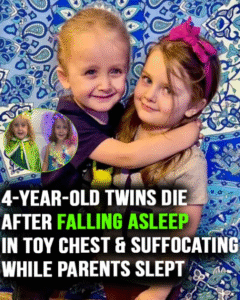The Cedar Chest: A Mother’s Warning After Unthinkable Loss
It was supposed to be just another night.
Sadie Myers, a mother of four in Jacksonville, Florida, had returned home from work and peeked in on her children, as she always did. Her twins—Aurora and Kellan, both four years old—had been tucked into bed earlier by their father, Don Starr. The house was quiet. The children appeared to be sleeping. Sadie ate dinner and went to bed, unaware that her world was about to shatter.
The next morning, their older brother went to wake the twins. What he found instead was silence. Aurora and Kellan were inside their cedar toy chest, arms wrapped around each other, unresponsive. Despite frantic efforts to revive them, both children were pronounced dead.
The cause: suffocation.
The twins had woken up in the early hours and, as they often did, decided to play. They climbed into the toy chest—a familiar place filled with stuffed animals and comfort. But at some point, the lid closed. Whether by accident or a sleepy movement, it sealed shut. And what Sadie Myers didn’t know—and what many parents still don’t—is that many wooden toy chests, once closed, become airtight and soundproof.
“So as they slept, all snuggled up together, they slowly ran out of oxygen within a couple of hours and passed away,” Sadie wrote in a devastating Facebook post.
Her words were raw, unfiltered, and filled with the kind of pain that defies language. “Not many will know the pain of losing two children at the same time, and losing them in a way that makes no sense,” she continued. “I hope knowing this helps in some way, and I hope if you have a toy box like this that you destroy it immediately.”
The post went viral—not because of its tragedy alone, but because of the urgent warning it carried. Sadie wasn’t just grieving. She was trying to prevent another family from experiencing the same nightmare.
Aurora and Kellan were the youngest of four siblings. They were inseparable, often described as “two halves of one soul.” They played together, slept together, and, heartbreakingly, died together. Their bond was so deep that even in their final moments, they held each other close.
The cedar chest had been tied shut previously, Sadie explained, because it was only used to store stuffed animals. But the children had begged her to open it so they could play. She never imagined it could become a trap.
The Jacksonville Sheriff’s Office responded to the emergency call around noon on Saturday, August 25. “Life-saving efforts were performed, but sadly both children were pronounced deceased,” Lt. Adam Blinn said. No foul play was suspected. It was a tragic accident—one that could happen to anyone.
In the days that followed, the Myers family was enveloped in grief. But Sadie chose to speak out. She shared photos of her twins, memories of their laughter, and the unbearable silence they left behind. She urged parents to check their homes, to rethink what might seem harmless, and to never assume safety.
Her warning resonated.
Across the country, families began inspecting their toy chests. Some destroyed them. Others modified them with ventilation holes or removed the lids entirely. Pediatricians and child safety experts echoed Sadie’s message, emphasizing that airtight containers pose serious risks, especially to small children.
The Consumer Product Safety Commission (CPSC) has long warned about the dangers of toy chests with heavy, locking lids. In fact, similar accidents have occurred over the years, prompting recalls and design changes. But many older chests remain in circulation—passed down through families, purchased secondhand, or simply overlooked.
Sadie’s story brought renewed urgency to the issue.
But beyond the safety warning, her words carried something deeper: a portrait of love, loss, and the fragile beauty of childhood. Aurora and Kellan weren’t just names in a headline. They were vibrant, joyful, and deeply loved. Their absence is a wound that will never fully heal.
“I know they are in heaven,” Sadie wrote. “I know they are together. But I miss them. I miss their giggles. I miss their messy room. I miss their tiny shoes lined up by the door.”
Her grief is a mirror for every parent’s worst fear. And her courage in sharing it is a gift—one that may save lives.
In memory of Aurora and Kellan, the Myers family has launched a campaign to raise awareness about toy chest safety. They’re working with local officials and child safety organizations to educate parents and push for stricter regulations. Their hope is that no other family will have to endure what they have.
The cedar chest is gone now. But its story remains.
It’s a reminder that danger can hide in plain sight. That love sometimes means asking hard questions. And that even in the darkest moments, a mother’s voice can shine a light.
Sadie Myers didn’t choose to become an advocate. But in the wake of unimaginable loss, she found purpose. She turned pain into warning, grief into action, and memory into legacy.
Aurora and Kellan’s story is not just a tragedy. It’s a call to awareness, a plea for vigilance, and a testament to the enduring power of love.



